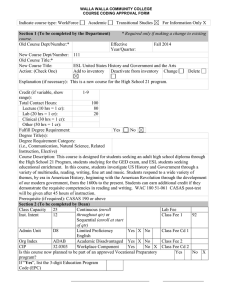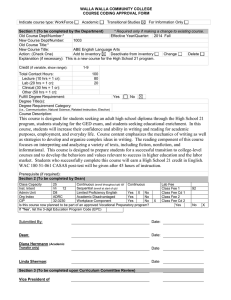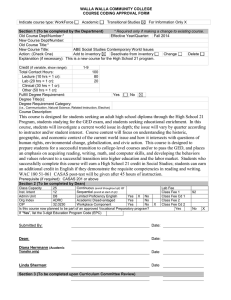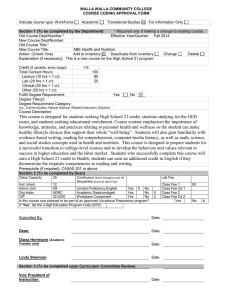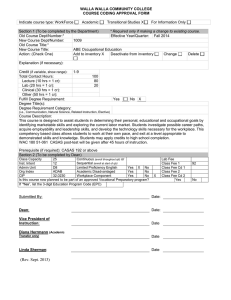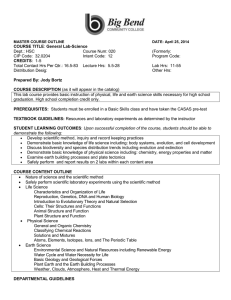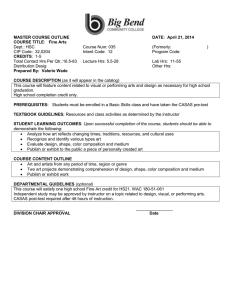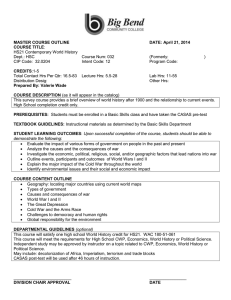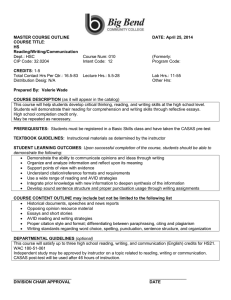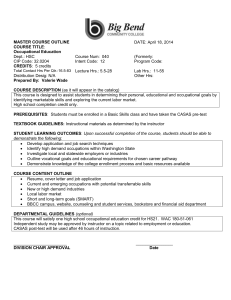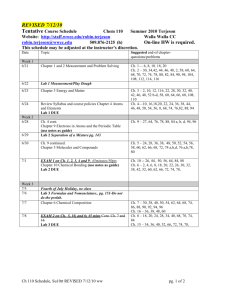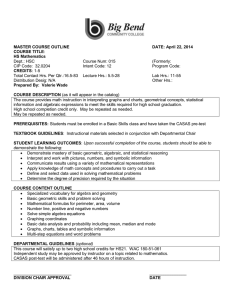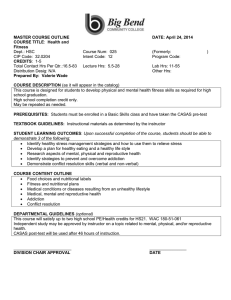WALLA WALLA COMMUNITY COLLEGE COURSE CODING APPROVAL FORM Indicate course type: WorkForce
advertisement
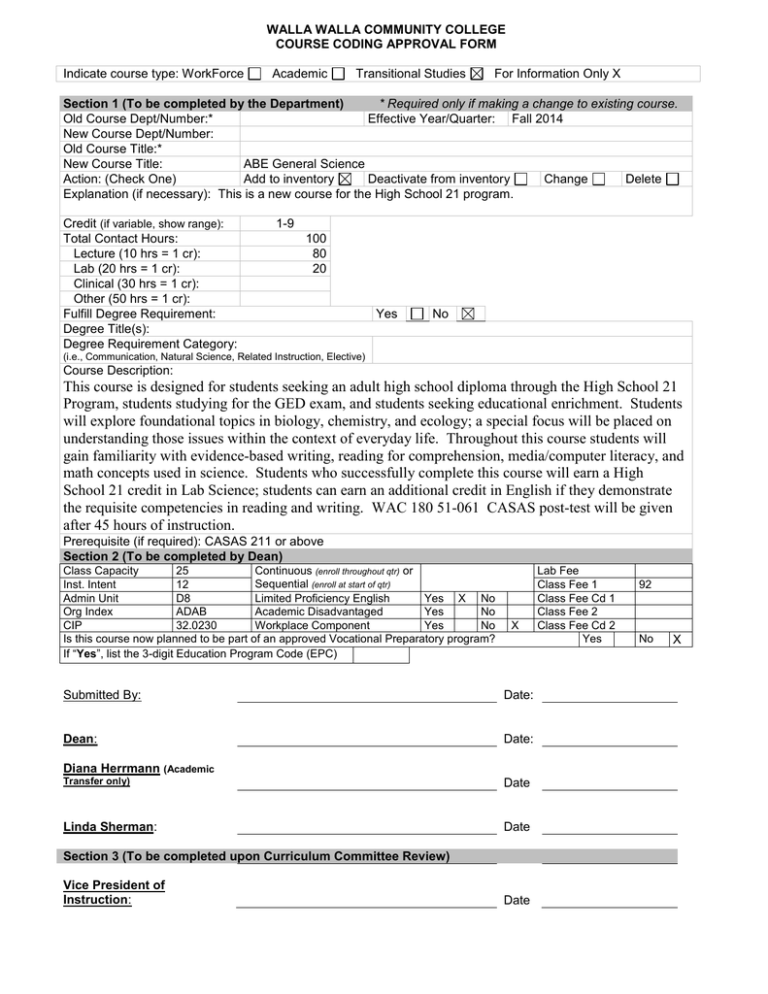
WALLA WALLA COMMUNITY COLLEGE COURSE CODING APPROVAL FORM Indicate course type: WorkForce Academic Transitional Studies For Information Only X Section 1 (To be completed by the Department) * Required only if making a change to existing course. Old Course Dept/Number:* Effective Year/Quarter: Fall 2014 New Course Dept/Number: Old Course Title:* New Course Title: ABE General Science Action: (Check One) Add to inventory Deactivate from inventory Change Delete Explanation (if necessary): This is a new course for the High School 21 program. Credit (if variable, show range): Total Contact Hours: Lecture (10 hrs = 1 cr): Lab (20 hrs = 1 cr): Clinical (30 hrs = 1 cr): Other (50 hrs = 1 cr): Fulfill Degree Requirement: Degree Title(s): Degree Requirement Category: 1-9 100 80 20 Yes No (i.e., Communication, Natural Science, Related Instruction, Elective) Course Description: This course is designed for students seeking an adult high school diploma through the High School 21 Program, students studying for the GED exam, and students seeking educational enrichment. Students will explore foundational topics in biology, chemistry, and ecology; a special focus will be placed on understanding those issues within the context of everyday life. Throughout this course students will gain familiarity with evidence-based writing, reading for comprehension, media/computer literacy, and math concepts used in science. Students who successfully complete this course will earn a High School 21 credit in Lab Science; students can earn an additional credit in English if they demonstrate the requisite competencies in reading and writing. WAC 180 51-061 CASAS post-test will be given after 45 hours of instruction. Prerequisite (if required): CASAS 211 or above Section 2 (To be completed by Dean) Class Capacity 25 Continuous (enroll throughout qtr) or Sequential (enroll at start of qtr) Inst. Intent 12 Admin Unit D8 Limited Proficiency English Yes X No Org Index ADAB Academic Disadvantaged Yes No CIP 32.0230 Workplace Component Yes No Is this course now planned to be part of an approved Vocational Preparatory program? If “Yes”, list the 3-digit Education Program Code (EPC) X Submitted By: Date: Dean: Date: Diana Herrmann (Academic Transfer only) Date Linda Sherman: Date Section 3 (To be completed upon Curriculum Committee Review) Vice President of Instruction: Date Lab Fee Class Fee 1 Class Fee Cd 1 Class Fee 2 Class Fee Cd 2 Yes 92 No X (Rev. Nov. 2013) Walla Walla Community College Master Course Outline Dept/Div: Course Number: Title: Admin Unit: Credits: Contact hours per quarter: Total contact hours: Mode of Instruction: Quarter(s) Offered: Quarterly Schedule Course Description: Transitional Studies ABE Science Unit D 1-9 100 Lecture Summer 80 Lab Fall X Winter X Spring X Even Year 20 Clinical Odd Year Catalog Course Description: This course is designed for students seeking an adult high school diploma through the High School 21 Program, students studying for the GED exam, and students seeking educational enrichment. Students will explore foundational topics in biology, chemistry, and ecology; a special focus will be placed on understanding those issues within the context of everyday life. Throughout this course students will gain familiarity with evidence-based writing, reading for comprehension, media/computer literacy, and math concepts used in science. Students who successfully complete this course will earn a High School 21 credit in Lab Science; students can earn an additional credit in English if they demonstrate the requisite competencies in reading and writing. Prerequisite: Co-requisite: Recommended: Instructor Permission: Additional Information: (i.e. cross listed course) Intended Learning Outcomes: CASAS Score of 211 of above (if needed) Yes No Explain the levels of biological organization from the atomic level to the ecosystem level. Demonstrate knowledge of basic chemistry including the properties of atoms, ions, chemical bonding and chemical reactions. Explain the importance of observation and hypothesis testing in a scientific process, and distinguish between science and nonscientific practices. Perform scientific investigations in a lab setting; gather, analyze, and critically evaluate scientific data; and communicate scientific results according to appropriate academic standards. Interpret and explain basic scientific data represented in charts and graphs. Utilize basic research skills to locate and evaluate information presented online and in the media to determine if the information is “scientific and credible”. Identify how authors organize text and use vocabulary for specific purposes and audiences, and apply these strategies to Course Topics: Latest Outline Revision: academic reading and writing. Produce writing that analyzes and synthesizes multiple texts and logically develops and supports key ideas. Use computer skills/programs for academic purposes such as word processing, email, and learning management systems as well as apply information technology to increase background knowledge, and access new information. The Scientific Method Characteristics of life Cells – functions, structures, and division Evolution Genetics Chemistry – Periodic table and chemical reactions Ecology – local, regional, and global Cycles – water, nitrogen, and carbon Biodiversity Reading comprehension and writing skills Media literacy Computer fundamentals June 2014
